
"Folsom Prison Blues" is a song by American singer-songwriter Johnny Cash. Written in 1953, it was first recorded and released as a single in 1955, and later included on his debut studio album Johnny Cash with His Hot and Blue Guitar! (1957), as the album's eleventh track. Borrowing liberally from Gordon Jenkins' 1953 song, "Crescent City Blues", the song combines elements from two popular folk styles, the train song and the prison song, both of which Cash continued to use for the rest of his career. It was one of Cash's signature songs. Additionally, this recording was included on the compilation album All Aboard the Blue Train (1962). In June 2014, Rolling Stone ranked it No. 51 on its list of the 100 greatest country songs of all time.

Johnny Cash at San Quentin is the 31st overall album and second live album by American singer-songwriter Johnny Cash, recorded live at San Quentin State Prison on February 24, 1969, and released on June 16 of that same year. The concert was filmed by Granada Television, produced and directed by Michael Darlow. The album was the second in Cash's conceptual series of live prison albums that also included At Folsom Prison (1968), På Österåker (1973), and A Concert Behind Prison Walls (1976).
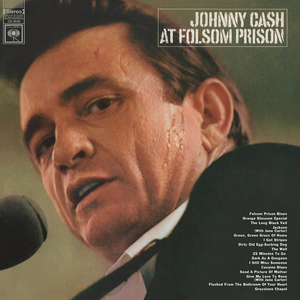
Johnny Cash at Folsom Prison is the first live album by American singer-songwriter Johnny Cash, released on Columbia Records on May 6, 1968. After his 1955 song "Folsom Prison Blues", Cash had been interested in recording a performance at a prison. His idea was put on hold until 1967, when personnel changes at Columbia Records put Bob Johnston in charge of producing Cash's material. Cash had recently controlled his drug abuse problems, and was looking to turn his career around after several years of limited commercial success. Backed by June Carter, Carl Perkins, and the Tennessee Three, Cash performed two shows at Folsom State Prison in California on January 13, 1968. The initial release of the album consists of fifteen songs from the first show and two from the second.

The Tennessee Three was the backing band for country and rockabilly singer Johnny Cash for nearly 25 years, providing the unique backing that came to be recognized by fans as "the Johnny Cash sound".

"Back in the U.S.A." is a song written by Chuck Berry that was released in 1959 and was a top 40 hit. A cover version in 1978 by Linda Ronstadt was also a hit.

Roses in the Snow is the seventh studio album by country music artist Emmylou Harris, released in 1980. While Harris' previous release, 1979's Blue Kentucky Girl, featured traditional, straight-ahead country, Roses in the Snow found Harris performing bluegrass-inspired music, with material by Flatt and Scruggs, Paul Simon, The Carter Family, and Johnny Cash. Cash, Dolly Parton, Linda Ronstadt, The Whites, Ricky Skaggs, Willie Nelson and Tony Rice made guest appearances. "Wayfaring Stranger" was released as the first single in 1980 and went to #7 on the Billboard Country charts. The second single, a remake of a Simon & Garfunkel song, "The Boxer", reached #13. Backing musicians included Albert Lee and Jerry Douglas.
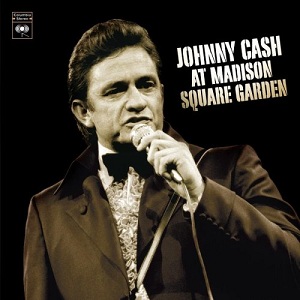
Johnny Cash at Madison Square Garden is a 1969 recording of a Johnny Cash concert at Madison Square Garden. It was released in 2002.
Glen Milborn Sherley was an American who became a country singer-songwriter after his song "Greystone Chapel" was made famous by Johnny Cash in 1968. Sherley wrote the song while in prison and it was later performed by Cash at his Folsom Prison performance, which was eventually released as the album At Folsom Prison. Sherley was in the front row, unaware that his song was going to be performed.

Boom Chicka Boom is the 76th album by American country music singer Johnny Cash, released in 1990 on Mercury Records. The title refers to the sound that Cash's backing band, the Tennessee Three, were said to produce. It includes a cover of Harry Chapin's "Cat's in the Cradle", and a song written by Elvis Costello for Cash, "Hidden Shame". "Don't Go Near the Water" is a re-recorded version and its original had been recorded for Ragged Old Flag. It discusses the issue of pollution of the environment. In 2003, Mercury released Boom Chicka Boom paired with Johnny Cash is Coming to Town on a single compact disc, though the bonus track "Veteran's Day" was left off. "Farmer's Almanac" and "Cat's in the Cradle" were released as singles, but failed to chart; the album itself, however, reached No. 48 on the country charts. The album has backing vocals by Elvis Presley's old backing group The Jordanaires, and Cash's mother.

The Mystery of Life is the 77th album by country singer Johnny Cash, released in 1991, and his last for Mercury Records. The songs featured are culled from both recent sessions and from leftovers from Cash's first Mercury session in 1986 for the album Johnny Cash is Coming to Town.

Johnny Cash på Österåker is a live album by country singer Johnny Cash released on Columbia Records in 1973, making it his 43rd overall release. The album features Cash's concert at the Österåker Prison in Sweden held on October 3, 1972. Its counterparts in concept are the more notable At Folsom Prison (1968), At San Quentin (1969), and A Concert Behind Prison Walls (1976). Unlike aforementioned, På Österåker does not contain any of Cash's most well-known songs; it does, however, include a version of Kris Kristofferson's "Me and Bobby McGee". "Orleans Parish Prison" was released as a single, faring rather poorly on the charts. Cash had previously recorded "I Saw a Man" for his 1959 album, Hymns by Johnny Cash.

Strawberry Cake is a live album and 53rd overall album by American singer Johnny Cash, released on Columbia Records in 1976. The album includes numerous pieces of between-song stage banter. The album includes several of Cash's most well-known early songs, such as "Big River", "I Still Miss Someone" and "Rock Island Line", as well as a number of more obscure compositions, some of which were performed by Cash for the first time; this includes "Strawberry Cake" and "Navajo". The title track was released as a single, but did poorly on the charts, peaking at No. 54.
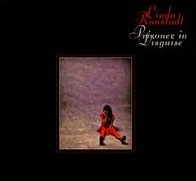
Prisoner In Disguise (1975) is Linda Ronstadt's sixth solo LP release and her second for the label Asylum Records. It followed Ronstadt's multi-platinum breakthrough album, Heart Like a Wheel, which became her first number one album on the US Billboard 200 album chart in early 1975.

The Johnny Cash Show is an American television music variety show that was hosted by Johnny Cash. The Screen Gems 58-episode series ran from June 7, 1969, to March 31, 1971, on ABC; it was taped at the Ryman Auditorium in Nashville, Tennessee. The show reached No. 17 in the Nielsen ratings in 1970.
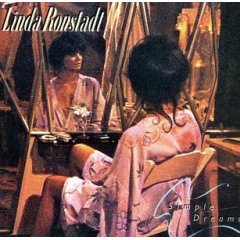
Simple Dreams is the eighth studio album by the American singer Linda Ronstadt, released in 1977 by Asylum Records. It includes several of her best-known songs, including her cover of the Rolling Stones song "Tumbling Dice" and her version of the Roy Orbison song "Blue Bayou", which earned her a Grammy nomination for Record of the Year. The album also contains covers of the Buddy Holly song "It's So Easy!" and the Warren Zevon songs "Poor Poor Pitiful Me" and "Carmelita". The album was the best-selling studio album of her career, and at the time was the second best-selling album by a female artist. It was her first album since Don't Cry Now without long-time musical collaborator Andrew Gold, though it features several of the other Laurel Canyon-based session musicians who appeared on her prior albums, including guitarists Dan Dugmore and Waddy Wachtel, bassist Kenny Edwards, and producer and multi-instrumentalist Peter Asher.
Paul Kennerley is an English singer-songwriter, musician, and record producer working in the American contemporary country music industry.
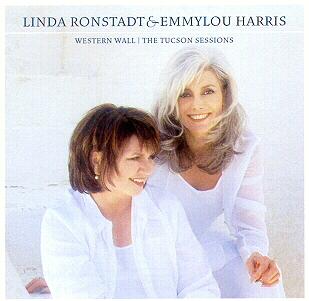
Western Wall: The Tucson Sessions is a 1999 duet album by American singer, songwriter, and producer Linda Ronstadt and singer, songwriter, and guitarist Emmylou Harris, who had previously collaborated on two albums with Dolly Parton.

Hail! Hail! Rock 'n' Roll is a 1987 American documentary film directed by Taylor Hackford that chronicles two 1986 concerts celebrating rock and roll musician Chuck Berry's 60th birthday. A soundtrack album was released in October 1987 on the MCA label. The name comes from a line in Berry's song "School Days".

Livin', Lovin', Losin': Songs of the Louvin Brothers is a tribute album to the music of The Louvin Brothers, released in 2003.

Live In Hollywood is a live album by Linda Ronstadt. It was recorded at Television Center Studios in Hollywood, California on April 24, 1980, for broadcast as a special on HBO. All tracks from this recording except "Blue Bayou" and "Poor Poor Pitiful Me" are previously unreleased. This is the first live album released by Ronstadt. The master tapes, thought to be lost, were discovered through a chance encounter with a Warner Brothers engineer leading to their recovery.


















